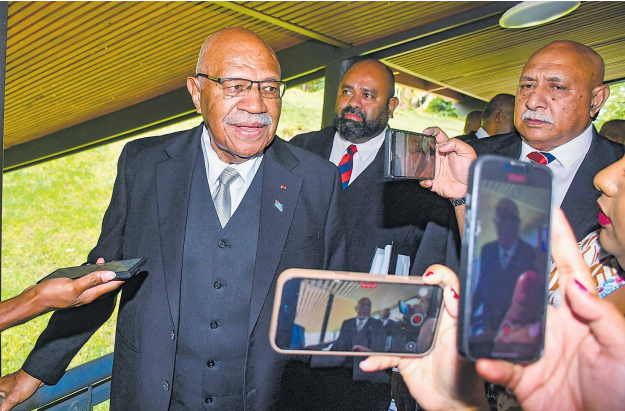Prime Minister Sitiveni Rabuka’s confirmation that a draft Bill to amend the 2013 Constitution is ready for tabling — and that he already has the parliamentary numbers to pass it — should be a moment of democratic triumph. Instead, it feels like a sobering reminder that old political habits die hard. While the Supreme Court’s landmark ruling offered Fiji a rare opportunity to break from its history of top-down constitutional impositions, the government’s hurried approach threatens to reduce this profound judicial guidance to little more than a numbers game in Parliament. What was meant to be a pathway to national consensus risks becoming a political bulldozer in disguise.
THERE is no denying the significance of the Supreme Court’s opinion. By declaring the previous amendment thresholds — requiring three-quarters of all MPs and three-quarters of registered voters, including non-voters — “unworkable” and reflective of a “democratic deficit,” the court did more than adjust legal technicalities. It repudiated the very philosophy of the 2013 Constitution: That fundamental law could be imposed on the people rather than shaped by them. In their place, the court instituted a new framework: Amendments must now be supported by two-thirds of Parliament and a simple majority in a referendum. This was designed not just to make change possible, but to make it legitimate — rooted in deliberation and popular consent.
Yet, the Prime Minister’s announcement suggests a preoccupation with the arithmetic of change rather than the spirit of change. Boasting that “I know I have the numbers” and emphasizing parliamentary tactics over participatory process, echoes the very style of politics the Supreme Court’s ruling sought to transcend. It is true that the government’s previous attempt in March, which received 40 votes, would have passed under the new two-thirds threshold (requiring 37 votes). But reducing this profound constitutional moment to a question of vote-counting misses the point entirely. The court’s judgment was an invitation to nation-building, not a green light for political deal-making.
The government’s approach — fast-tracking a draft Bill through Cabinet and Parliament with what a friend termed “indecent haste”— risks creating a constitutional amendment, that is legal, but not legitimate. The Supreme Court provided a dual requirement: Parliamentary supermajority and a referendum. This two-step process was clearly intended to ensure that amendments are not only negotiated among political elites, but also explained, debated, and ultimately endorsed by the people. By rushing the parliamentary process, the government threatens to treat the referendum as a mere formality — a rubber stamp on a deal already struck in the corridors of power. This would repeat the very “democratic deficit” the court condemned.
A meaningful process would look very different. It would embrace the court’s ruling as a mandate to foster genuine dialogue across all sectors of society. Before tabling any Bill, the government should initiate an inclusive, transparent, and unhurried national conversation — facilitated by the promised Constitution Review Committee and parliamentary committees — about what changes are needed and why. This is not about delaying justice, but about ensuring that changes are deeply understood and broadly owned by the citizens, who must live under them. A referendum should be the culmination of a educated national debate, not a leap of faith demanded of an uninformed electorate. For the ordinary Fijian, this is not a matter of political point-scoring, but of democratic principle. We have lived through constitutions crafted in secrecy and imposed by decree. We have seen how legalistic compliance without genuine buy-in leads to instability and resentment. The Supreme Court has offered us a way out of this cycle — a chance to replace imposition with conversation, and diktat with consensus. It would be a tragic irony if the government used the court’s ruling to validate a process that remains, in spirit, profoundly at odds with the democratic renewal the judiciary envisioned.
The Prime Minister is correct about one thing: this is about keeping promises to the people of Fiji. But the most important promise — bigger than any particular amendment — is the promise of a democracy that is truly by and for the people. That means respecting not just the letter of the court’s ruling, but its essence: That lasting change must be built together, with patience, transparency, and respect for the voices of all. The Supreme Court has given us a pathway. It is up to our leaders — and to us — to walk it with integrity, not run through it with haste.



